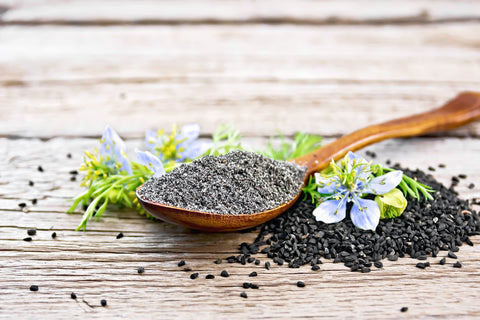The immune system consists of the organs and multiple processes that happen within the body, to provide resistance to infections and toxins that are found in the food we eat, drink or our environment.
Key Causes of Weak Immune System
- Deficiency of Vitamin D, Zinc, Magnesium, Vitamin B12, Selenium, Vitamin C, A, K, and E.
Research suggests that a lack of vitamin D could be an important factor, contributing to weakness of the immune system and inability to overcome viral infections. Almost every person in England is deficient in vitamin D, due to the lack of sunshine, which is very important for the normal function of the nervous and immune system.
- Insufficient sun exposure (sun exposure promotes the production of vitamin D).
- An insufficient number of “good” probiotic bacteria, in the colon.
- Lack of antioxidants such as Glutathione, Alpha lipoic acid, NAC, CoQ10, etc.
- Lack of sleep.
- An unhealthy diet, low in raw vegetables and fibre. Also, overconsumption of dairy products (cheese, pizza), refined sugar, meat, white flower products, etc.
- Use of antibiotics and stimulants (smoking, alcohol, caffeine, drugs, etc).
- Emotional stress, anxiety, depression, low mood, and negative thinking.
- Lack of exercise, which leads to poor blood circulation and low oxygenation of immune cells.
- Hormonal imbalance.
- A high concentration of toxins within the body such as mercury, lead, fluoride, and others.
How to Boost Your Immune System
Supplements to Support the Immune System
- Take a supplement with multiple ingredients, formulated to support the immune system such as Betaimune which contains a unique combination of powerful antioxidants such as Pine Bark Extract, CoQ10, Mixed Berries, Mixed Carotenoids, Citrus Bioflavonoids and Red Grape Extract. With Vitamin D, A, E, Zinc, Selenium, and other nutrients for optimum immune support.
- Take a good quality Probiotic formula (such as ImmuProbio). Our immune system is affected by the ratio of “good” to “bad” bacteria within the gut. When the bacteria is unbalanced, particularly a high concentration of “bad” bacteria, this contributes to acute and chronic infections and inflammation.
- Vitamin D is beneficial in preventing respiratory tract infections.
Immune cells have special receptors for Vitamin D and depend on it for strength and normal function.
- Magnesium plays important role in the proper conversion and absorption of vitamin D. When large doses of Vitamin D don’t seem to work, the real problem is magnesium deficiency. Magnesium deficiency causes vitamin D to be stored and remain inactive!
- Zinc inhibits colds and viruses. Taking Zinc at the start of a common cold or flu, helps minimise the duration and severity of symptoms.
Zinc is thought to be toxic to certain types of viruses and helps stimulate antibody production.
- Selenium boosts immunity and helps defend against viral and bacterial infections, autoimmune diseases and allergies. 200mg of Selenium per day may help prevent viruses from replicating.
Selenium attaches to glutathione which work together to reduce and repair damage done to DNA.
- Vitamin B12 is involved in the production of white blood cells, which deal with viral infections and inflammation. Many individuals have low white blood cell count (including meat-eaters) as deficiency in Vitamin B12 is so common.
- Being an antioxidant, Vitamin C helps maintain a stronger immune system by protecting the body from oxidative damage caused by free radicals.
- Glutathione is a powerful antioxidant that strengthens the immune system and is one of the most effective remedies against inflammation. It boosts the body’s ability to modulate and regulate the immune system.
It is important to provide the body with ingredients that increase glutathione production in the liver, by taking Turmeric, Milk Thistle, L-cysteine or NAC (N-acetyl cysteine), Alpha Lipoic Acid, Bilberry, Vitamin C supplements. Or consuming asparagus, broccoli, peaches, avocado, spinach, garlic, squash, grapefruit.
- Propolis has anti-inflammatory, antiviral and antibacterial properties. It can help prevent and shorten the duration of common respiratory diseases, such as flu or cold.
- Ginger can kill viruses, bacteria and yeasts according to numerous studies. It soothes a sore throat, has the ability to kill rhinoviruses (the cause of most colds) and stimulates the immune system by increasing your body temperature. Ginger also prevents the accumulation of toxins that make you susceptible to viral, fungal and bacterial infections.
- Studies have demonstrated that Garlic helps reduce the risk of flu and colds and may reduce the severity of symptoms.
- Astragalus extract is regarded as an energy and immune system booster. By taking astragalus extract, specialised cells within the body have an enhanced ability to fight intruders, including viruses.
Astragalus also modulates immunity, helping prevent fighter cells from attacking own body cells and reducing symptoms of inflammation and various autoimmune diseases (such as rheumatoid arthritis).
Foods to Support the Immune System
- Citrus fruits
- Red bell peppers
- Broccoli
- Garlic
- Ginger
- Spinach
- Yoghurt
- Almonds
- Sunflower seeds
- Turmeric
- Green tea
- Papaya
- Kiwi
- The best diet to support your immune system is one that has a large variety

Lifestyle Recommendations
- Limit the use of stimulants such as caffeine products, alcohol and tobacco.
- Learn to control stress and think positive!
- Exercise in the morning, outside to boost circulation, oxygenation and serotonin levels.
- Expose your body to sunlight whenever it is possible.
- Go to sleep as early as possible. Try to sleep at least seven or eight hours a day.
- Eat raw home-made Sauerkraut every day, as inflammation, weakness of the immune system and autoimmune diseases are linked to the deficiency of the probiotic bacteria in the gut.
- Avoid foods with refined sugar as this makes fighter cells behave like drunken soldiers. White flour products weaken the immune system because they are quickly converted to sugar.
Instead of sugar and other harmful sweeteners you can use xylitol, erythritol, stevia or organic raw honey, in moderation.
- Avoid all artificial sweeteners, high glucose/fructose syrup.
- Increase consumption of plant-based and unrefined foods with plenty of raw vegetable juices and salads.
- Avoid/significantly reduce consumption of dairy products, meat, animal products and bad fats.
- Wash your hand after being in a public space and before you handle food.
Related Articles
- Common Cold
- Iron to Boost Energy, Immunity & Brain Function, But… | HealthAid
- How to Maintain Strong Immune System to Combat Coronavirus | HealthAid
Sources
- https://www.ncbi.nlm.nih.gov/pmc/articles/PMC3659258/
- Linus Pauling, Vitamin C and the Common Cold, p. 38, 84
- Yejin Kim, Hyemin Kim, Seyeon Bae, et al (2013) Immune Netw. 2013 Apr; 13(2): 70–74
- The Telegraph, G. Michael Allan, MD and Bruce Arroll, MB ChB PhD (2014) Prevention and treatment of the common cold: making sense of the evidence. 28 Jan 2014 CMAJ. 2014 Feb 18
- Singh M1, Das RR (2013) Zinc for the common cold. Cochrane Database Syst Rev. 2013 Jun 18;(6)
- V Vetvicka, J Vetvickova (2014) Immune-enhancing effects of Maitake.
- www.alive.com/health/astragalus-the-immune-warrior/
- Propolis: Otolaryngologia Polska 1989;43(3):180-4.
- Propolis: Isr Med Assoc J 2002 Nov;4(11 Suppl):923-7.
- Propolis: Int Immunopharmacol. 2004 Jul;4(7):975-82.
- Propolis: Vet Immunol Immunopathol. 2007 Mar 15;116(1-2):79-84.
- Echinacea: Daily Mail 10/10/2012
- Melchart D, Linde K, Fischer P (2000) Echinacea for preventing and treating the common cold. Cochrane Database Syst Rev. 2000;(2):CD000530.
- Vitamin D supplementation to prevent acute respiratory tract infections: systematic review and meta-analysis of individual participant data. BMJ 2017; 356 doi: https://doi.org/10.1136/bmj.i6583 (Published 15 February 2017):
- NHS: The new guidelines on vitamin D – what you need to know, Thursday July 21, 2016: Vitamin D - NHS (www.nhs.uk)
- Nantz MP1, Rowe CA, Muller CE, Creasy RA, Stanilka JM, Percival SS. (2016). Supplementation with aged garlic extract improves both NK and γδ-T cell function and reduces the severity of cold and flu symptoms: a randomized, double-blind, placebo-controlled nutrition intervention. Clin Nutr. 2012 Jun;31(3):337-44. doi: 10.1016/j.clnu.2011.11.019. Epub 2012 Jan 24.
- Josling P1. (2001). Preventing the common cold with a garlic supplement: a double-blind, placebo-controlled survey. Adv Ther. 2001 Jul-Aug;18(4):189-93.
- Astragalus: https://www.mensjournal.com/health-fitness/the-cold-remedy-that-actually-works-20160316
- 15 Foods That Boost the Immune System: Citrus, Bell Peppers & More (healthline.com)
Image by Freepik
Any information or product suggested on this website is not intended to diagnose, treat, cure or prevent any medical condition. Never disregard medical advice or delay in seeking it because of something you have read on this website. Consult your primary healthcare physician before using any supplements or making any changes to your regime.





